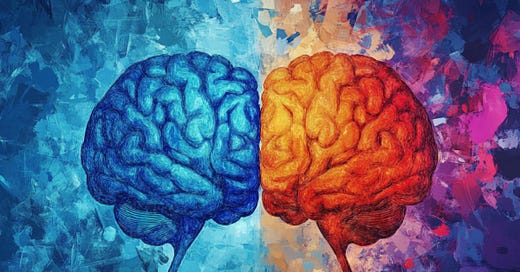When I was around four, I was told stories about two boys, Chotu and Motu. Chotu was the ‘good kid’ who always listened and obeyed. Motu was the ‘bad kid’ who ignored advice and got hurt or scolded.
Every day, based on how I’d behaved, the story would be retold with me, sometimes as Chotu’s friend (Divya vs. Motu) and sometimes as Motu’s shadow (Chotu vs. Divya).
Naturally, I started craving the version where I was the obedient one. My face would light up when I earned the “good girl” ending. Obedience, I believed, brought praise, love, and safety.
As I grew older, the stories changed. I found myself flipping through the pages of MagicPot, reading about Mayavi and Luttappi. Mayavi, the righteous hero, always defeated Luttappi, the foolish, disobedient arch-rival. The moral never shifted: disobedience led to trouble; obedience led to victory.
But then came teenage years. And reality. Suddenly, the choices weren’t so binary. The questions I asked didn’t always have answers. The rules I was told to follow sometimes contradicted each other.
I started noticing that ‘being good’ often meant being quiet. Following orders didn’t always feel right. That sometimes, obedience looked a lot like suppression. And disobedience? It wasn’t always chaos. Sometimes, it was clarity. Sometimes, it was necessary.
We’ve all been there: punished for reacting to bullying.
Told to stay quiet. Do not fight back. Not “engage”.
I was told that obedience would protect me — that silence would stop the cruelty.
But it didn’t.
Silence wasn’t safety. It was a cage.
The obedience that helped me grow taught me to ignore my instincts. And I didn’t know how to separate the two.
Naturally, I started disobeying at some point – not out of defiance, but out of desperation to feel whole.
I questioned what I was told. I spoke when silence was expected. I pushed back on rules that didn’t make sense. And for the first time, I felt something dangerously unfamiliar: relief.
The first time I disobeyed something deeply ingrained – a rule, a person, a role I was expected to play – I didn’t feel powerful... I felt sick.
I questioned everything.
What if I’m becoming cold? Arrogant? Unkind?
What if this isn’t liberation - just selfishness in disguise?
The voices echoed in my head like a constant drumbeat:
“Are you sure?”
“What will people think?”
“Is this necessary?”
“Am I taking this too far?”
Every decision was and is overthought a hundred times.
I open 10 tabs in my mind for every boundary I try to draw.
I rehearse my sentences like I’m preparing for a trial.
And yet - the moment I follow through?
I feel...light.
Not victorious. Not rebellious.
Just clear.
Like I finally said yes to myself after years of swallowing no’s.
Disobedience didn’t harden me. It haunted me first, showed me the silence I had mistaken for peace.
But then, slowly, it filled me with a voice I didn’t recognise because it wasn’t scared.
And that voice? It didn’t destroy who I was.
It returned me to who I’ve always been underneath all the noise.
Maybe this is what “growing up” really is- not just” paying bills and showing up on time, but choosing your values in a world that keeps trying to sell you someone else’s through traditional culture and template responses such as “this is how it always was”.
Maybe disobedience is a phase.
Maybe it’s a return, remember it’s a reckoning.
The same way I outgrew the stories of Chotu and Motu, the world, too, is outgrowing its old stories.
Things we once accepted as “normal” - workplace harassment, casual racism and sexism, borderline-abusive parenting masked as discipline, period stigma, emotional suppression in men, good girl syndrome-are finally being seen for what they are: broken systems built on obedience.
Obedience trained us to survive those systems.
Disobedience is what’s finally making them tremble.
We were told to adjust, respect, and endure.
But now, people are questioning, calling out, reclaiming.
From #MeToo to men finally breaking generational silence around emotions and abuse, from queer rights to mental health awareness – real change is coming from those who dared to disobey quietly accepted violence.
If obedience is the training wheels, it teaches you how to stay upright in a world you don’t yet understand - Then disobedience is the main wheel that lets you ride the damn bike through life.
Wobbly at first. Scary. But essential. Because training wheels aren’t meant to stay on forever.
And if they do? You never move forward. You just circle the same block of inherited fear.
I’m still learning how to pedal. Still learning when to brake, when to steer clear, and when to ride straight into uncomfortable truths.
This keeps me going: even when I trip, I see others pedalling too — clumsy, courageous, figuring it out beside me.
Disclaimer: Disobedience isn’t always right. Some people disobey to destroy, dominate, or deceive.
But the disobedience I’m talking about?
It’s the kind that heals.
The kind that frees you.
The kind that says, “I love you, but I will not obey something that kills me.”
I am not asking you to be loud for the sake of it. I’m asking you to stop betraying yourself to be “good.”
You don’t owe obedience to what erases you.
Obey when it’s love. Disobey when it’s survival.




